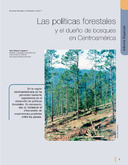| dc.contributor.author | Leppänen, K.J. | |
| dc.date.accessioned | 2015-03-19T21:47:38Z | |
| dc.date.available | 2015-03-19T21:47:38Z | |
| dc.date.issued | 2004-11 | |
| dc.identifier.issn | e-ISSN: 1659-1216 | es_EN |
| dc.identifier.uri | https://repositorio.catie.ac.cr/handle/11554/6487 | |
| dc.description.abstract | En Centroamérica, el propietario privado es el principal actor en la producción forestal. En algunos países centroamericanos no existen políticas formalmente aprobadas y, en otros casos, la política escrita no refleja necesariamente la realidad. Por ello se consultó con los principales actores acerca de la implementación de políticas forestales, con el fin de investigar el desarrollo real de tales políticas y conocer los puntos de vista de los distintos actores. La consulta se realizó por medio de una entrevista semi-estructurada a 58 personas entre funcionarios de gobierno, profesionales independientes y propietarios forestales. El problema principal para el dueño de bosques es la inseguridad de poder cosechar. Los propietarios desconfían de la continuidad de las políticas y leyes forestales y de los servicios forestales; también tienen problemas para comercializar sus productos. Por su parte, los funcionarios del gobierno echan la culpa a la tenencia de la tierra y al establecimiento de áreas protegidas. Entre los gobiernos, se da una tendencia a liberalizar el cultivo de árboles en plantaciones forestales y buscar, mediante planes de manejo, que el manejo de los bosques naturales sea sostenible. Los propietarios reconocen el esfuerzo, pero consideran que los trámites son poco ágiles. En cuanto a formación, capacitación, extensión, información e investigación, la situación es bastante similar en todos los países: hay acciones aisladas pero con poca planificación y coordinación por entes estatales. | es_ES |
| dc.description.abstract | The private forest owner is the principal actor in production in Central America. As in all the countries there is no formal policy documents and in some other cases the documents are not necessarily reflected in the reality, interviews of the principal actors in the implementation of forest policies were carried out. The research applied semi structured interviews directed to 58
government officers, independent forestry professionals and representants of forest owners. The principal problem of a private forest owner is insecurity related to harvesting forest products. However, there is big difference in the definition of the causes of such insecurity
between the different groups interviewed; the forest owners themselves emphasize the lack of confidence in forest policy, law and forest service as well as problems in marketing of forest
products. Government officers emphasize the insecurity caused by lack of official land titles and by expansion of protected areas. In the mechanisms of control the governments seek to establish strict controls on harvesting native forest and to relax the control in case of forest plantations. The forest owners acknowledge the effort, but at the same time express their dissatisfaction on the slowness of the process. Concerning the indirect incentives (e.g.
education, training, extension, information and research) the situation is equal in all the countries; some services are provided, but there is no holistic programme planned and
coordinated by the government. | |
| dc.format.extent | 9 páginas | |
| dc.language.iso | es | es_ES |
| dc.publisher | CATIE, Turrialba (Costa Rica) | |
| dc.relation.ispartof | Recursos Naturales y Ambiente Número 43 (Noviembre 2004), páginas 9-17 | |
| dc.rights | info:eu-repo/semantics/openAccess | |
| dc.subject | PROPIEDAD PRIVADA | |
| dc.subject | PRODUCCION FORESTAL | |
| dc.subject | POLITICA FORESTAL | |
| dc.subject | INCENTIVOS | |
| dc.subject | AMERICA CENTRAL | |
| dc.subject | BOSQUES | |
| dc.subject | PLANTACION FORESTAL | es_ES |
| dc.title | Las políticas forestales y el dueño de bosques en Centroamérica | es_ES |
| dc.type | Artículo | es_ES |
| dc.journal.issueNumber | 43 | |


